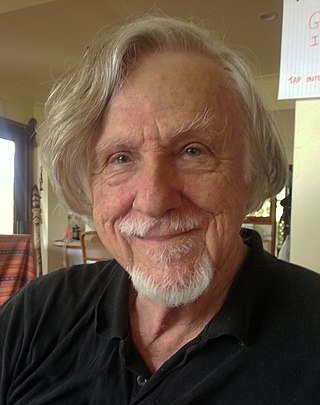
William Norman McLaren, LL. D. was a Scottish Canadian animator, director and producer known for his work for the National Film Board of Canada (NFB). He was a pioneer in a number of areas of animation and filmmaking, including hand-drawn animation, drawn-on-film animation, visual music, abstract film, pixilation and graphical sound. McLaren was also an artist and printmaker, and explored his interest in dance in his films.
Roman Kroitor was a Canadian filmmaker who was known as a pioneer of Cinéma vérité, as the co-founder of IMAX, and as the creator of the Sandde hand-drawn stereoscopic 3D animation system. He was also the original inspiration for The Force. His prodigious output garnered numerous awards, including two BAFTA Awards, three Cannes Film Festival awards, and two Oscar nominations.

Arthur Lipsett was a Canadian filmmaker with the National Film Board of Canada. His short, avant-garde collage films, which he described as "neither underground nor conventional”, contain elements of narrative, documentary, experimental collage, and visual essay. His first film, Very Nice, Very Nice, was nominated for an Academy Award.

Ryan Larkin was a Canadian animator, artist, and sculptor who rose to fame with the psychedelic Oscar-nominated short Walking (1968) and the acclaimed Street Musique (1972). He was the subject of the Oscar-winning film Ryan.
George Garnett Dunning was a Canadian filmmaker and animator. He is best known for producing and directing the 1968 film Yellow Submarine.

Michael Dattilo Rubbo is an Australian documentarian/filmmaker.
Colin Archibald Low was a Canadian animation and documentary filmmaker with the National Film Board of Canada (NFB). He was known as a pioneer, one of Canada's most important filmmakers, and was regularly referred to as "the gentleman genius". His numerous honors include five BAFTA awards, eight Cannes Film Festival awards, and six Academy Award nominations.
Cosmic Zoom is a 1968 short film directed by Robert Verrall and produced by the National Film Board of Canada. It depicts the relative size of everything in the universe in an 8-minute sequence using animation and animation camera shots. All drawings by Eva Szasz.

Grant Munro LL. D. was a Canadian animator, filmmaker and actor. In 1952, he co-starred with Jean-Paul Ladouceur in Norman McLaren's Neighbours. His film, Christmas Cracker, was nominated for an Academy Award in 1965.

Gerald Potterton was a Canadian director, animator, producer and writer. He is best known for directing the cult classic Heavy Metal and for his animation work on Yellow Submarine.
Evelyn Lambart was a Canadian animator and film director with the National Film Board of Canada, known for her independent work, and for her collaborations with Norman McLaren.

Thomas Cullen Daly was a Canadian film producer, film editor and film director, who was the head of Studio B at the National Film Board of Canada (NFB).
John Spotton C.S.C. was a Canadian filmmaker with the National Film Board of Canada.
John Kemeny was a Hungarian-Canadian film producer whom the Toronto Star called "the forgotten giant of Canadian film history and...the most successful producer in Canadian history." His production credits include The Apprenticeship of Duddy Kravitz, Atlantic City, and Quest for Fire.

Albert Kish was a Canadian documentarian/filmmaker.
Robert Verrall is a Canadian animator, director and film producer who worked for the National Film Board of Canada (NFB) from 1945 to 1987. Over the course of his career, his films garnered a BAFTA Award, prizes at the Cannes Film Festival and Venice Film Festival, and six Academy Award nominations.
Stanley Jackson (1914–1981) was a Canadian film director, producer, writer and narrator with the National Film Board of Canada (NFB).
The 22nd Canadian Film Awards were held on October 3, 1970 to honour achievements in Canadian film. The ceremony was hosted by broadcaster Bill Walker.
The 13th Canadian Film Awards were held on May 13, 1961 to honour achievements in Canadian film.
Jacques Giraldeau (1927-2015) was a Canadian documentary filmmaker from Quebec. He spent most of his career at the National Film Board of Canada and became known primarily for his films about the history of Quebec as seen through the eyes of its artists. He had a fondness for the avant-garde and many of his films are considered to be experimental.








